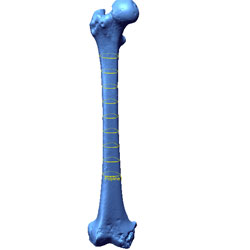 CAMBRIDGE, ENGLAND—An analysis of the lower leg bones of Central European farmers who lived between 7,300 and 1,150 years ago by Alison Macintosh of Cambridge University suggests that men carried out less physically demanding tasks over time. Their work load was probably lightened by the specialization of labor, the production of metal goods, and the development of trade networks. Macintosh found that the changes in women’s bones were not as consistent, however, indicating that they may have been performing a wide variety of tasks that did not require traveling long distances or carrying heavy loads. In fact, women’s skeletons from two of the earliest cemeteries in the study showed signs of tooth wear from processing activities. “As more and more people began doing a wider variety of crafts and behaviors, fewer people needed to be highly mobile, and with technological innovation, physically strenuous tasks were likely made easier. The overall result is a reduction in mobility of the population as a whole, accompanied by a reduction in the strength of the lower limb bones,” Macintosh told the University of Cambridge news service.
CAMBRIDGE, ENGLAND—An analysis of the lower leg bones of Central European farmers who lived between 7,300 and 1,150 years ago by Alison Macintosh of Cambridge University suggests that men carried out less physically demanding tasks over time. Their work load was probably lightened by the specialization of labor, the production of metal goods, and the development of trade networks. Macintosh found that the changes in women’s bones were not as consistent, however, indicating that they may have been performing a wide variety of tasks that did not require traveling long distances or carrying heavy loads. In fact, women’s skeletons from two of the earliest cemeteries in the study showed signs of tooth wear from processing activities. “As more and more people began doing a wider variety of crafts and behaviors, fewer people needed to be highly mobile, and with technological innovation, physically strenuous tasks were likely made easier. The overall result is a reduction in mobility of the population as a whole, accompanied by a reduction in the strength of the lower limb bones,” Macintosh told the University of Cambridge news service.